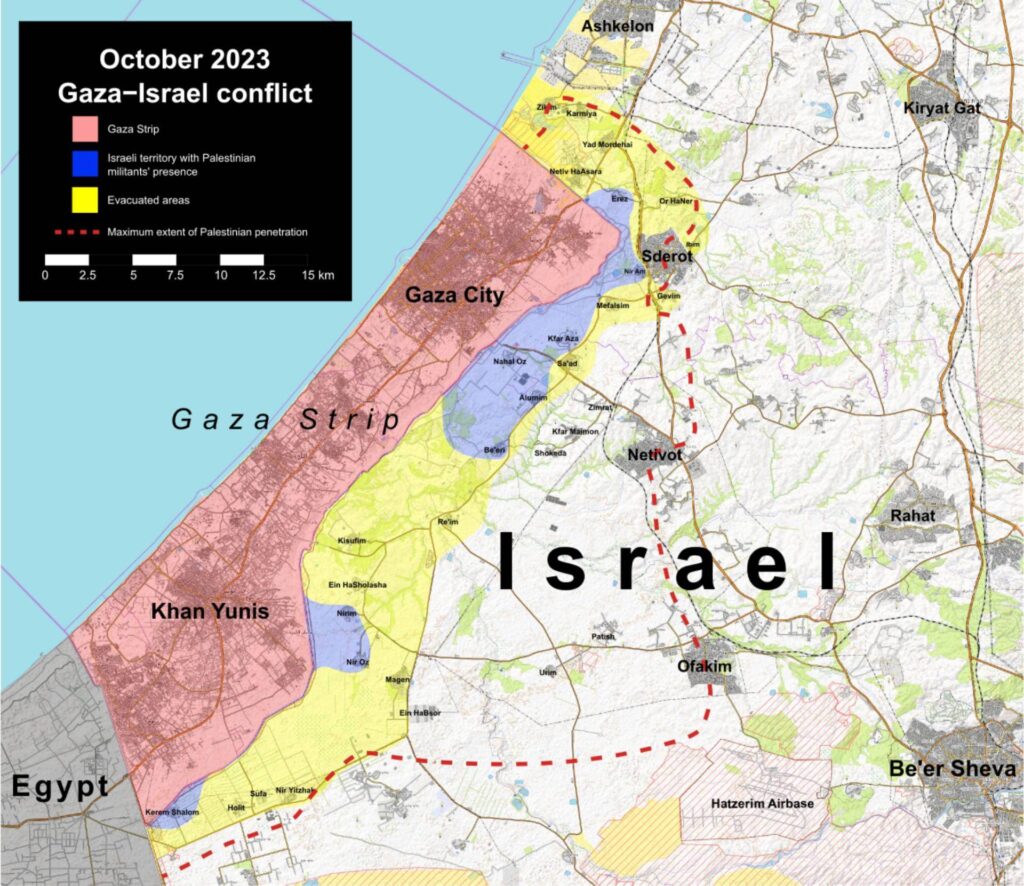The Middle East region is reeling under the first blows of war between Israel and Hamas. A three-pronged invasion (on the ground, with rockets and by boat) by Hamas terrorists into the southern part of Israel, wreaking havoc on Israeli citizens across the country, has stunned the whole world. October 7 is now for Israelis what November 26 was for Indians or September 11 for Americans.
Once again, the Israel and Palestine conflict has come into focus, not by light flare but uncontrolled fire, which has pushed the Middle East back into its old days of heightened tensions, possibly snowballing into full-fledged regional war. After the Russia–Ukraine war in Europe, another war frontier has opened in the Middle East. This conflict will alter the regional geopolitical balance.
However, Hamas pulling off an attack of such magnitude has raised serious questions over its sterling intel agencies, the foreign intelligence agency Mossad and the domestic intelligence agency Shin Bet. Didn’t they see it coming? Or did they underestimate it?
In my view, the changing dynamics of Middle East geopolitics in the wider region played some role in misting Israel’s intelligence glass.
Changing power balance in the Middle East
The thaw between Israel and the Arab World began with a series of agreements and accords from Camp David in 1978, to the Oslo Accords in 1993 and 1995, and the more recent Abraham Accords. This has allowed the powers of the Middle East to a somewhat more comfortable position. By taking the focus off of the Israel-Palestine hotspot, the normalization process has given way for regional forces to converge for their regional and national interests. For example, Saudi Arabia has shifted its focus to economic development, namely with its Saudi Vision 2030 project.
More distant powers interested in the region — such as the quartet of China, Pakistan, India and the US — also got some breathing space in the region. Operation Sankalp, India’s maritime engagement to ensure the security of Indian vessels in Middle Eastern waters, got some breathing time when the Abraham Accords happened becuase the accords eased the risks along trade routes in the Persian Gulf where ships off the Emirati coast were previously trapped in crosshairs of Israel and Iran covert warfare as the rival powers targeted each others vessels. Similarly, New Delhi’s Look West Policy got a fillip from the visit of former Army Chief General M. M. Narvane to United Arab Emirates and Saudi Arabia in December 2020 (Narvane was the first Indian army chief to do so).
Similarly, China’s brokering peace between Iran and Saudi Arabia has prepared a base for its economic ingressions in the region.
The so-called West Asian Quad or I2U2, which is an informal cooperation between the US, Israel, India, and the Emirates, has likewise increased its geopolitical relevance in the Middle East amid the cold war with Iran, aiming to block Chinese and Russian inroads. From time to time, these geopolitical configurations are able to exert enough control in the region to prevent conflict and increase stability. At least, that is the hope.
At the same time, the thawing of relations antagonises the Arab players sitting at the extreme ends of the spectrum such as Hezbollah, the Houthis and other Arab proxies of Iran. So, in spite of better relations between most of the state actors, the region is still a tinderbox. Recent various initiatives such as the Middle East Corridor at the G20 and the much-talked about potential normalization of ties between Saudi Arabia and Israel have stirred the extremist hornet nest. So, while on the surface the situation appeared more amenable to Israeli interests and safer, it also created the potential for an explosive reaction, which we have unfortunately seen on October 7.
Israel’s vengeance
Now, the situation is much different. War has broken out again in the Levant, and Hamas’s deadliest terror strike on Israel has triggered a spine-chilling Israel’s massive retaliation. Dubbed Operation Iron Sword, the counterattack involves heavily striking Hamas locations across Gaza. Continued pounding bombs, air strikes, targeting banks, media houses and the like have paralysed the Gaza strip. There is little doubt that Israel will continue its assault with determination.
It wouldn’t be correct now to say that the balance of power or the geopolitical force of the Middle East is at risk; it is on the verge of collapse. Israel won’t stop; many forces in the Arab world, including Syria along with Hezbollah and other extremists groups, would mobilize, backed by Iran. War, or even the risk of war, will give a strategic shock the world again if not controlled as it did in 1973 oil crisis.
Interestingly, Israel’s vengeance mode will provide the US a small opening to establish its hard power relevance in Middle East after decades which will to some extent revive its security architecture which came under heavy storm during Russia–Ukraine war. The US has flexed its military muscles by sending two carrier strike groups to the Mediterannean waters off of the Israeli coast. The purpose of this is not to aid the Israeli military in Gaza directly, but to serve as a warning to neighboring countries. With Israel distracted, its hostile neighbors might see the moment as an opportunity to strike. So, the US is using its hard power to deter Iran and its proxies.
This tactic may help rebuild the US’s image as a nation able to project power in the region. This image has been weakened by the ongoing war in Ukraine, as well as by tense relations between the US and Saudi Arabia. China recently stimied the US by pulling off a partial rapprochement between Saudi Arabia and Iran.
Still, the US is taking some risks in employing its hard power influence vis-à-vis Israel. By doing so it may exacerbate tensions with its Arab partners, especially Saudi Arabia, won’t let a conflict in Palestine go without protest.
How many power alterations will the Middle East see, especially the conflict of territories, with a bright chance to see some makeovers in a few days? Perhaps its answer requires some patience and tight observance in the coming days.
Mossad’s colossal miss
Israel has been caught off guard vis-à-vis Hamas, something which brings back the memories of the 1973 Yom Kippur War. Then, too, Israel failed to rightly assess its opponents’ intentions.
Although tensions between the two countries had been rising to that point, Israel did not expect Egypt and Syria to launch an attack on October 6, 1973. The Mossad had not been left completely without warning, however, and at almost the last moment, a Mossad asset codenamed “Angel” communicated that Egypt and Syria were about to launch an offensive. The Mossad ignored the information, however, as it it ran counter to its assessment of Egypt. The institute did not believe that Egypt could attack Israel because it believed they did not posses the necessary technology to counter Israeli airpower. They were wrong. Egypt was able to carry out an effective and complex offensive against Israel using Soviet SAM-6 missiles for air defense.
The 1973 failure contributed to the fall of Golda Meir’s government and the sacking of its military intelligence chief, Eli Ziera, after the Agranant Commission investigated the failure of Israel’s defence forces and intelligence.
A close examination of the Mossad’s intelligence misses shows that, then as well as now, the real problem in Israel’s famed intelligence agency does not lie in intelligence gathering or awareness of the threat; the real problem lies in the assessment and feedback part, which is an integral part of the intelligence cycle.
Nations often pay a heavy price for biased or half-baked assessments and underestimated feedback. Israel falters, not in raw intelligence but in intelligence management, either by assesing intelligence through a prejudiced or biased perspective or by underestimating the policy response warranted by the intel in hand.
Although we cannot say so with certainty, Mossad may well have received some prior intelligence on the October 7 attack, but they underestimated Hamas’s capability of carrying out a well-coordinated three-pronged attack. Four possible reasons why they thought this are:
- Overconfidence in Israel’s technology — Iron Dome, border security, surveillance capabilities, etc.
- Normalization of ties between Israel and Arab nations, which perhaps led Mossad to believe that the situation with Palestine too was thawing.
- Divided Israeli attention in the West Bank and domestic politics. Israel feared that the recent surge in unrest in the West Bank would lead to widespread violence. Israeli citizens, too, were restless. Security establishments were therefore focused on the West Bank and domestic fronts and distracted from Gaza.
- Iran’s nuclear obsession, which kept Mossad under the impression that Iran would not wish to stir the pot because it was engaged in delicate negotiations regarding the Joint Comprehensive Plan of Action via backchannels with the US. Israel might have been under the valid impression that Iran would not sabotage the nuclear deal by encouraging an offensive action by its ally Hamas, at least for a time. At the time, Iran was lowering the pace of its nuclear stockpiling. The action of lowering stockpiling can be seen as a deception to shift Mossad’s attention and make them believe that Iran was still strongly pursuing the deal via backchannels. If, as per some reports, Iran was behind the attack, it succeeded in carrying out a cladestine proxy attack where Iran can excercise clean denaiblity and play safe. Even if not, the appearance of detente may have contributed to catching Israel off guard.
As strategic affairs expert and national security analyst Praveen Swami notes, “successful conduct of war demands endless intellectual creativity.” A senior Israeli journalist notes that intelligence failure is attributed to “sinful arrogance of the Israeli defence establishment.”
From a purely military standpoint, the three-pronged attack was a feat in intellectual creativity that defeated famed Israeli technologies at the borders. It is time for Israel’s intelligence community to recognize its own failure of imagination, to build strategic foresight, and to avoid misting their intelligence glass with complacent assesments in the future. For now, Hamas has sabotaged any further attempts at Israeli normalization with the Arab world, and what lies ahead is anybody’s guess.
[Erica Beinlich edited this piece.]
The views expressed in this article are the author’s own and do not necessarily reflect Fair Observer’s editorial policy.
The post The Mossad’s Startling Miss In the Middle East appeared first on Fair Observer.
from World News - Independent, Nonprofit Media https://ift.tt/0uBcGYo https://ift.tt/4JoG57u






0 Comments
Online Latest Bangla News, Article - Sports, Crime, Entertainment, Business, Politics, Education, Opinion, Lifestyle, Photo, Video, Travel, National, World.
Emoji